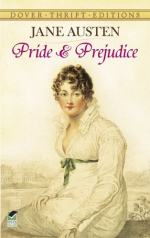|
|
Pride and Prejudice Author/Context
Jane Austen was born on December 16, 1775 to the Reverend George Austen and his wife in Hampshire, England. The sixth child of seven, Jane was educated mostly at her home although she and her sister, Cassandra, were sent away to school for several years when they were young. Austen wrote several works when she was in her teens, but her major works were written later in her life.
Although she wrote novels of romance, Austen never married. In fact, her life is considered rather dull. She had a few romantic attachments, but the one man she deemed worthy of commitment died before they could become engaged. She and her sister, also a spinster, lived with their parents the duration of their lives.
Jane Austen knew firsthand what it was like to live with a meager income because after her father died, she, Cassandra, and their mother were forced to live on a small income and the charity of her wealthy brother. For the five years after her love interest died and her father died, Austen did not write.
Once she and her family were settled at Chawton Cottage in 1809, she began writing again. Sense and Sensibility was published in 1811, followed by Pride and Prejudice in 1813. Her other major novels include: Northanger Abbey (1818), Emma (1816), Mansfield Park (1814), and Persuasion (1818). The latter three of her novels were written in rapid succession in the years just before her death.
Austen's novels were met with success during her lifetime, but she published anonymously, so she had no real fame. On July 18, 1817 Jane Austen succombed to Addison's disease and died in her sister's arms.
Austen is regarded as one of the finest woman writers of her time. Her work is most well-known for the way she makes her characters seem so realistic, the way she explores the nuances of relationships, and the way she makes fun of the trends and attitudes of her era.
World Literature Criticism declares that "for all their wit and good humor, Austen's works are deeply concerned with the moral values in life, and her satire is at its finest when aimed at the snobbish and presumptuous."
As for Pride and Prejudice, it remains one of Austen's best-loved and best-known works.
Elizabeth Jenkins said, "The celestial brightness of Pride and Prejudice is unequalled even in Jane Austen's other work; after a life of much disappointment and grief, in which some people would have seen nothing but tedium and emptiness, she stepped forth as an author, breathing gaiety and youth, robed in dazzling light."
It was her gift for making the everyday things seem interesting that made Jane Austen the highly-esteemed author that she is more than a century after her death.
Bibliography
"Austen, Jane." British Authors of the Nineteenth Century. eds. Stanley J. Kunitz and Howard Haycraft. New York: The H. W. Wilson Company, 1936.
"Austen Jane." The Oxford Companion to English Literature. ed. Margaret Drabble Oxford: Oxford University Press, 1985.
Austen, Jane. Pride and Prejudice. New York: W.W. Norton & Company, Inc., 1966.
"Austen, Jane." World Literature Criticism: 1500 to present. ed. James P. Draper. vol. 2. Detroit: Gale Research Inc., 1992.




